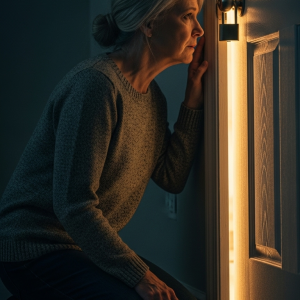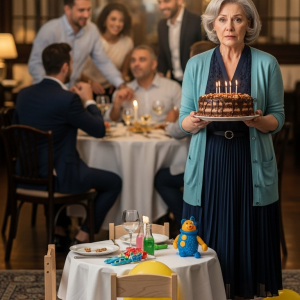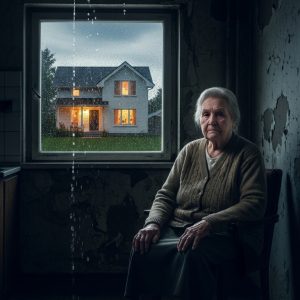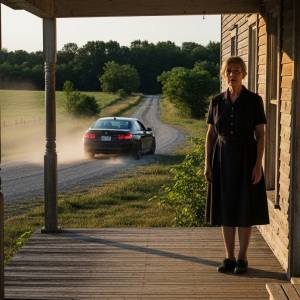“You’re embarrassing me,” Matthew hissed through clenched teeth, his fingers tightening around his wine glass. The crystal caught the ambient lighting of the expensive restaurant, sending prisms dancing across our pristine white tablecloth. His mother, Brooke, sat across from us, her crimson lips curved in a smirk that made my stomach churn.
After fifteen years of marriage, I knew this moment would define everything. “I can’t pay for this dinner, Matthew. You know I’ve been helping my sister with her medical bills. I don’t have $3,000 to spare.” The truth was, I had been quietly building my escape fund, squirreling away money from my job as an interior designer.
“Always excuses,” Brooke chimed in, swirling her wine. “Matthew told me you’ve been quite successful with your little decorating business. Surely you can treat your mother-in-law to one special dinner.” Her voice dripped with the same condescension I’d endured for years.
“I said no.” My voice was quiet but firm.
The change in Matthew’s expression was immediate. His sophisticated facade cracked, revealing the rage beneath. In one fluid motion, he lifted his glass of Cabernet Sauvignon and threw the contents directly in my face. The wine was cold, staining my cream-colored blouse crimson. Gasps erupted from nearby tables.
“Pay the bill,” Matthew demanded, his voice low and dangerous, “or this marriage ends right here.”
I reached up, slowly wiping the wine from my eyes. My hands were steady. Fifteen years of diminishment, of financial manipulation, of walking on eggshells—all of it crystallized in this moment. But instead of shame, I felt something else rising within me: clarity.
I stood up, my chair scraping against the floor. “You’re right about one thing, Matthew. This ends here.” I reached into my purse, pulled out my phone, and with deliberate movements, I started recording.
“What do you think you’re doing?” he sputtered, reaching for my phone.

I stepped back, keeping the camera trained on him. “Creating evidence,” I replied, my voice stronger than I’d ever heard it. “Would you like to throw something else at me? Perhaps explain to everyone here why you think it’s acceptable to assault your wife?”
“Mrs. Harrison?” The restaurant’s manager had appeared, his expression grave. “I’m going to have to ask you and your son to leave immediately.” He turned to me. “Ma’am, would you like us to call the police?”
I kept recording. “Try me,” I said to Matthew’s furious face.
Before I made the call that would start my new life, I had one more thing to say. “The funny thing is, Matthew, I’ve already paid for this dinner. I’ve been paying for everything for fifteen years. My dignity, my freedom, my sense of self. But not anymore. Check our joint account tomorrow. I think you’ll find it makes for some interesting reading.”
The police officer’s name was Andrea Taylor, and she had kind eyes. We sat in a quiet corner of the precinct as she reviewed my statement, the wine on my blouse now a dull burgundy stain.
“Mrs. Harrison?”
“Rebecca,” I corrected her. “Just Rebecca Porter. I’m going back to my maiden name.”
She nodded. “Rebecca, you mentioned this isn’t the first incident.”
I took a sip of the lukewarm coffee they’d given me. “The wine-throwing, that was new. Matthew always preferred less visible methods. Financial control, emotional manipulation, isolation. The real masterpiece was how he handled money. Every time my design business succeeded, he’d find ways to drain my accounts while his mother orchestrated expensive dinners that I was expected to fund.”
Officer Taylor’s pen moved steadily. “And last night, you mentioned something about a joint account?”
A small smile crossed my face. “Ah yes, my insurance policy. For two years, I’ve been documenting everything. I also kept records of how Matthew used our joint account for personal expenses while claiming business deductions. The IRS will be very interested.”
“That’s why you were recording.”
“Partly. But mostly because I knew what would happen when he checked the joint account this morning. While he was busy trying to intimidate me, my lawyer was executing the paperwork I’d prepared months ago. Every questionable transaction, every tax discrepancy—it’s all been submitted to the relevant authorities.”
The officer leaned back, studying me. “You’ve been planning this for a long time.”
“Two years, three months, and twelve days,” I said. “That’s how long it took me to realize that the shame I felt wasn’t mine to carry. It belonged to them.”
A knock on the door interrupted us. Another officer entered. “Ms. Porter, we have some visitors. One is Brooke Harrison’s lawyer. The other… says she’s your sister-in-law, Catherine Harrison.”
My heart skipped a beat. Kate, Matthew’s younger sister. The black sheep, cut off years ago. Another relationship Matthew had managed to sever. The real reason Brooke had orchestrated that dinner, I realized, was that she’d discovered something I’d known for months: her perfect son had been embezzling from his own family’s foundation, and I had proof.
Kate looked exactly as I remembered her—wild curly hair and a defiant glint in her eyes. She sat alone in the interview room. When our eyes met, she stood up and hugged me.
“I saw the video,” she whispered. “Someone at the restaurant posted it online. You magnificent, brave woman.”
We sat down, and she pulled out a worn notebook. “Remember when I was cut off from the family? It wasn’t just because I refused to join the family business. I found something five years ago, something about your design business, Rebecca. And about several other businesses owned by Harrison family spouses.”
My throat went dry. “What about them?”
“They were never meant to succeed,” Kate’s voice was gentle, but her words hit like blows. “In fact, their failure was the point. Brooke and Matthew have been running this scheme for years. They find successful, independent women, bring them into the family, and then systematically drain their assets. Once the woman is financially dependent, they have complete control.”
I thought of the other Harrison wives I’d met over the years. How many had been victims? “But why?”
“Power, control, and money laundering,” Kate said. “The Harrison Family Foundation is a front. They use these failing businesses to clean money. Each bankruptcy is perfect cover.”
Officer Taylor entered, her expression serious. “Rebecca, we just got a call from your sister Leah’s nurse. There’s been an incident at the hospital. Someone tried to access her room claiming to be family.”
“Matthew,” Kate and I said simultaneously.
“We need to move quickly,” Kate urged. “Leah isn’t just your sister, Rebecca. She’s a witness. Three years ago, before her cancer diagnosis, she was a bookkeeper for one of the Harrison subsidiary companies.”
The pieces started falling into place. Leah’s sudden illness, Matthew’s insistence on being involved in her medical care. As we rushed out, my phone buzzed with a text from an unknown number: You should have paid.
We burst into Leah’s hospital room and froze. Leah was sitting up in bed, thin but alert. At the foot of her bed stood Brooke Harrison. But it was the third person in the room that made my blood run cold: Malcolm Jones, the accountant who had supposedly helped me gather evidence. His expression was cold, professional.
“Rebecca,” Brooke’s voice dripped honey-coated venom. “How good of you to join us.”
Leah’s eyes met mine. “They tried to buy my silence,” she said quietly. “Again.”
“Malcolm?” I stared at him. “Was it Brooke’s idea? Get close to me, pretend to help, all while reporting back to her?”
“It’s more complicated than that,” he started, but Kate’s sharp laugh cut him off.
Leah’s hand tightened around mine. “Becca, the notebook in my bedside drawer.” I pulled it open and found a worn leather journal.
“Three years ago,” Leah said, her voice gaining strength, “I found irregularities in the books. Patterns. I started keeping records.” She coughed. “Then I started getting sick.”
The hospital room’s lights flickered, then went out completely. In the sudden darkness, I heard Leah gasp and the sound of running footsteps. When the emergency lights came on, Brooke and Malcolm were gone. But they’d left something behind on Leah’s medical chart.
I picked it up with trembling hands. As I read, I finally understood why Matthew had been so insistent on controlling Leah’s medical care. The truth was far worse than anything we had imagined.
A specialist reviewed Leah’s chart under the eerie emergency lights. “These treatment protocols…” she said, her expression grim. “Some of these medications would have mimicked and exacerbated the symptoms of her cancer. They were making her sicker while making it look natural.”
Brooke had left a backdated liability waiver with Leah’s forged signature, a paper trail to protect themselves.
“Their father, Richard Harrison,” Leah whispered, her voice gaining strength, “didn’t die of a heart attack. I was there. He found out Brooke and Matthew were embezzling. He was going to turn them in. I saw her put something in his coffee.”
My phone lit up. A message from Matthew with a photo of an empty wall in my home office. Leah’s painting of a lighthouse was gone. The text read: Did you really think I didn’t know? Come alone to the lake house. Time to finish this.
“Go,” Leah said firmly. “End this.”
I stepped into the hallway and made a call I hadn’t made in three years. “Claire? It’s Rebecca. I need your help. You still work for the FBI’s Financial Crimes division, right?”
Twenty minutes later, I was driving toward the lake house, a team of unmarked cars following at a discreet distance. What Matthew didn’t know was that while he’d focused on the painting, he’d missed something far more important: the contents of a locked drawer in Brooke’s desk, which explained everything.
The lake house door opened before I could knock. Matthew stood there, his eyes wild. “Where is it?” he demanded. “Your sister’s amateur painting.”
I walked into the living room where Brooke sat in an armchair, looking regal. “Leah told you,” Brooke said, her voice ice. “A mistake she won’t live to regret.”
“Actually,” I said, turning to face them, “she didn’t have to. Richard Harrison wasn’t just working with Leah. He was building a case with an ally. My father.” I held up my phone, showing security footage of my father meeting with Richard the day before he died. “Dad was a forensic accountant. He’d been tracking your family for years. When you had him killed, I stepped in. I’ve known from the very beginning.”
Suddenly, lights flooded the house from outside. Sirens wailed. “FBI!” a voice called through a megaphone. “The house is surrounded!”
As FBI agents led a stoic Brooke toward the door, she stopped and turned to me. “You know,” she said quietly, “you remind me of someone. A woman I used to be, before I made my choice.”
“What choice?” I asked.
“To become the predator instead of the prey,” Brooke’s smile was bitter. “Thirty years ago, Richard’s father did to me exactly what we have done to others. He destroyed my business, trapped me. When he died—not accidentally, I assure you—I decided to turn his weapon against others.”
The revelation hit me like a physical blow. She was the first victim.
“Check the foundations,” she said, her eyes locked on mine. “The real foundations. The lake house, the main house. Richard thought he was so clever with his evidence, never realizing I had my own collection growing right under his feet.”
In the main house, behind a Monet painting in Brooke’s study, we found a safe. Inside was a single envelope, addressed: To the one who ends it. The letter, written the day she discovered she was pregnant with Matthew, detailed everything.
In the hidden rooms beneath every Harrison property, you’ll find more than evidence, she wrote. You’ll find bank accounts, property deeds, and trust funds—a fortune built on broken dreams. For every business we destroyed, I kept separate records. I duplicated every asset. The key in this envelope will allow you to transfer it all back, with thirty years of interest. You fought back. You didn’t let the abuse turn you into an abuser. Use it wisely. Use it better than I did.
Three months later, I stood in the newly renovated Harrison Foundation building, now The Eyes Open Foundation for Women’s Economic Justice. Leah, now in remission, stood beside me. The hidden rooms had yielded exactly what Brooke promised—the means to restore everything that was stolen.
I looked out my office window at the women gathering below, victims turned survivors, ready to help others. My phone buzzed. It was Kate. Another one just came forward. A victim from the old days. She’s ready to tell her story.
Inside my office, once Brooke’s study, Leah’s lighthouse painting hung proudly. I understood now why she’d painted that double image—the truth above reflecting a deeper truth below. The sun in her painting was both rising and setting, an ending and a beginning, all at once.




